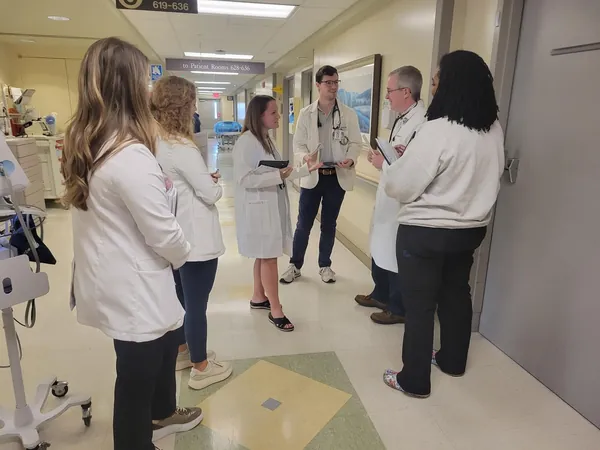
The Game-Changer in Health Care: How Pharmacists are Revolutionizing Multidisciplinary Teams
2024-11-26
Author: Mei
In recent years, the health care landscape has been transformed by a groundbreaking trend: collaborative, multidisciplinary teams working together to provide holistic patient care. This innovative strategy significantly enhances patient outcomes, particularly in an era characterized by the complexities of an aging population and escalating health care costs. The spotlight is now on pharmacists, whose contributions are proving to be essential in this collaborative approach.
Pharmacists: Guardians of Medication Safety
One of the pivotal roles pharmacists play is enhancing medication safety, particularly during transitions of care when patients navigate different environments—from home to hospital or back again. During these critical times, confusion may lead to errors. Pharmacists conduct meticulous medication reconciliation, ensuring accurate drug lists and minimizing the risk of adverse drug events.
Furthermore, they provide crucial dosing recommendations tailored to individual patient needs—considering factors like age, weight, and existing health conditions. Therapeutic Drug Monitoring (TDM) is another essential service pharmacists provide, particularly for medications with narrow therapeutic windows, enabling precise adjustments that ensure efficacy while mitigating risks of adverse effects.
Pharmacists also strive to combat the "prescribing cascade," a domino effect in which one medication’s side effects lead to further prescriptions. By identifying such issues, pharmacists can recommend discontinuing unnecessary medications, ultimately streamlining treatment plans.
Boosting Therapeutic Efficacy
To optimize treatment efficacy, pharmacists make evidence-based recommendations while continuously evaluating the success of interventions. For instance, in an infectious disease team, pharmacists might assist in monitoring aminoglycoside levels, ensuring that patients remain within therapeutic ranges. Their ongoing assessment is vital for adjusting dosages and maintaining optimal health outcomes.
Expanding Access to Medications
Pharmacists play a crucial role in expanding access to medications, particularly expensive or specialized drugs that might not be readily available in hospitals. They facilitate procurement processes and assist patients in navigating insurance systems—paving the way for therapies that may otherwise be out of reach.
Additionally, they connect patients to affordable medication programs, helping them find generics for as low as $4, or guiding them through patient assistance programs that offer medications at reduced costs. In a healthcare system laden with bureaucracy, the pharmacist is often the guiding light, helping patients maneuver through it all.
Cost Reduction: The Pharmacist’s Influence
By optimizing medication use and preventing adverse events, pharmacists not only ensure patient safety but also contribute to significant cost savings for health care institutions. Their intimate knowledge of hospital formularies allows them to promote evidence-based, cost-effective practices, alleviating financial burdens on both healthcare systems and patients.
Patient Education: The Heart of Pharmacy
The foundation of pharmacist care lies in patient education. Pharmacists are pivotal in ensuring patients understand their medications—clarifying how they work, their importance in treatment plans, and potential side effects. This education is critical in fostering medication adherence, leading to improved health outcomes.
Overcoming Challenges in Integration
Despite their invaluable contributions, pharmacists face challenges in gaining recognition within multidisciplinary health care teams. Some providers may still view pharmacists primarily as dispensers of medication rather than key participants in patient care. This perception hampers their ability to integrate fully into teams.
Moreover, competing priorities and inadequate physical space can pose obstacles to their effectiveness. Proximity to other team members is often vital for successful collaboration.
The Role of Leadership
The integration of pharmacists into health care teams is not merely a logistical addition; it demands strong leadership and clear communication across departments. Establishing defined roles and expectations is essential for maximizing the potential of pharmacists and enhancing team dynamics.
Effective leadership not only champions the benefits of integrating pharmacists but also provides necessary resources and support for their effective functioning within teams.
Conclusion: A New Era of Collaboration
As the role of pharmacists in multidisciplinary health care teams continues to expand, their essential contributions will redefine patient care. With their unique expertise, pharmacists are not just supporting players—they are pivotal to the success of the entire health care system, ensuring better patient outcomes and more efficient overall care.
Don’t miss the chance to see how this transformation in health care can directly impact you!



 Brasil (PT)
Brasil (PT)
 Canada (EN)
Canada (EN)
 Chile (ES)
Chile (ES)
 España (ES)
España (ES)
 France (FR)
France (FR)
 Hong Kong (EN)
Hong Kong (EN)
 Italia (IT)
Italia (IT)
 日本 (JA)
日本 (JA)
 Magyarország (HU)
Magyarország (HU)
 Norge (NO)
Norge (NO)
 Polska (PL)
Polska (PL)
 Schweiz (DE)
Schweiz (DE)
 Singapore (EN)
Singapore (EN)
 Sverige (SV)
Sverige (SV)
 Suomi (FI)
Suomi (FI)
 Türkiye (TR)
Türkiye (TR)